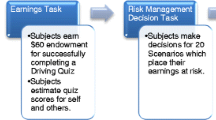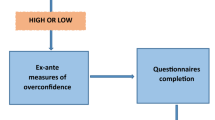Abstract
This article presents the results of a survey designed to test, with economically sophisticated participants, Ellsberg’s ambiguity aversion hypothesis, and Smithson’s conflict aversion hypothesis. Based on an original sample of 78 professional actuaries (all members of the French Institute of Actuaries), this article provides empirical evidence that ambiguity (i.e. uncertainty about the probability) affect insurers’ decision on pricing insurance. It first reveals that premiums are significantly higher for risks when there is ambiguity regarding the probability of the loss. Second, it shows that insurers are sensitive to sources of ambiguity. The participants indeed, charged a higher premium when ambiguity came from conflict and disagreement regarding the probability of the loss than when ambiguity came from imprecision (imprecise forecast about the probability of the loss). This research thus documents the presence of both ambiguity aversion and conflict aversion in the field of insurance, and discuses economic and psychological rationales for the observed behaviours.
Similar content being viewed by others
References
Becker S., Brownson F. (1964) What price ambiguity? or the role of ambiguity in decision-making. The Journal of Political Economy 72: 2–73
Budescu D., Kuhn K., Kramer K., Johnson T. (2002) Modeling certainty equivalents for imprecise gambles. Organizational Behavior and Human Decision Processes 88: 748–768
Budescu, D. and Wallsten, T. (1995), Processing linguistic probabilities: general principles and empirical evidence. In Busemeyer J., Hastie R. and Medin D.L. (eds.), Decision Making from a Cognitive Perspective. San Diego: Academic Press, pp. 275–318.
Budner S. (1962) Intolerance of ambiguity as a personality variable. Journal of Personality 30: 29–50
Cabantous, L., Hilton D., Shanteau, J. (2004) Ambiguity and conflict aversion: an attributional explanation for confidence in one’s judgment. Paper presented at the annual conference of the Society for Judgement and Decision Making (SJDM) Minneapolis, US, November 19–22.
Camerer C., Weber M. (1992) Recent developments in modelling preferences: uncertainty and ambiguity. Journal of Risk and Uncertainty 5: 325–370
Chesson H., Viscusi W.K. (2003) Commonalities in time and ambiguity aversion for long-term risks. Theory and Decision 54: 57–71
Cohen M., Jaffray J.-Y., Said T. (1985) Individual behavior under risk and uncertainty: an experimental study. Theory and Decision 18: 203–228
Cohen M., Jaffray J.-Y., Said T. (1987) Experimental comparison of individual behavior under risk and under uncertainty for gains and for losses. Organizational Behavior and Human Decision Processes 39(1):1–22
Curley S., Yates F. (1985) The center and range of the probability interval as factors affecting ambiguity preferences. Organizational Behavior and Human Decision Processes 36: 272–287
de Marcellis, N. (2000) Aux frontières de l’assurabilité des risques de l’entreprise, une analyse expérimentale des décisions de l’assureur. Thèse de doctorat en gestion.
Du N., Budescu D. (2005) The effects of imprecise probabilities and outcomes in evaluating investment option. Management Science 51(12):1791–1803
Ellsberg D. (1961) Risk, ambiguity and the Savage axioms. The Quarterly Journal of Economics 75: 643–669
Fox G., Tversky A. (1995) Ambiguity aversion and comparative ignorance. The Quarterly Journal of Economics 110: 585–603
Fox G., Weber M. (2002) Ambiguity aversion, comparative ignorance and decision context. Organizational Behavior and Human and Decision Processes 88(1):476–498
Gosh D., Ray M. (1992) Risk attitude, ambiguity intolerance and decision making: an exploratory investigation. Decision Science 23(2):431–444
Gosh D., Ray M. (1997) Risk, ambiguity and decision choice: some additional evidences. Decision Science 28(1):81–104
Heath C., Tversky A. (1991) Preference and belief: ambiguity and competence in choice under uncertainty. The Journal of Risk and Uncertainty 4: 5–28
Hilton D.J., Smith R.H., Kim S.-H. (1995) Processes of causal explanation and dispositional attribution. Journal of Personality and Social Psychology 68(3):377–387
Ho J., Keller L., Keltyka P. (2002) Effects of outcome and probabilistic ambiguity on managerial choices. The Journal of Risk and Uncertainty 24(1):47–74
Hogarth R., Kunreuther H. (1989) Risk, ambiguity and insurance. Journal of Risk and Uncertainty 2: 5–35
Kunreuther H., Meszaros J. Hogarth R., Spranca M. (1995) Ambiguity and underwriter decision processes. Journal of Economic Behavior and Organization 26: 337–352
Lauriola M., Levin I. (2001) Relating individual differences in attitude toward ambiguity to risky choice. Journal of Behavioral Decision Making 14: 107–122
Maffioletti A., Santoni M. (2005) Do trade union leaders violate subjective expected utility? some insights from experimental data. Theory and Decision 59(3):207–253
Savage L. (1954) The Foundations of Statistics. Wiley, New York
Sherman R. (1974) The psychological difference between ambiguity and risk. Quarterly Journal of Economics 88: 166–169
Shanteau, J. (1992) Competence in experts: the role of task Organizational Behavior and Human Decision Processes, 53(2) 252–266 (Special issue on Experts and Expert Systems).
Shanteau, J. (2001) What does it mean when expert disagree? In Salas, E., Klein, G. (eds.). Linking Expertise and Naturalistic Decision Making. NJ: Erlbaum.
Shanteau, J., and Stewart, T.R. (1992) Why study expert decision making? Some historical perspectives and comments. Organizational Behavior and Human Decision Processes 53(2) 95–106 (Special issue on Experts and Expert Systems).
Smithson M. (1999) Conflict aversion: preference for ambiguity vs conflict in sources and evidence. Organizational Behavior and Human Decision Processes 79(3):179–198
Taylor K. (1995) Testing credit and blame attributions as explanation for choices under ambiguity. Organizational Behavior and Human Decision Processes 64(2):128–137
Viscusi K., Chesson H. (1999) Hopes and fears: the conflicting effects of risk ambiguity. Theory and Decision 47: 153–178
Author information
Authors and Affiliations
Corresponding author
Rights and permissions
About this article
Cite this article
Cabantous, L. Ambiguity Aversion in the Field of Insurance: Insurers’ Attitude to Imprecise and Conflicting Probability Estimates. Theor Decis 62, 219–240 (2007). https://doi.org/10.1007/s11238-006-9015-1
Accepted:
Published:
Issue Date:
DOI: https://doi.org/10.1007/s11238-006-9015-1




